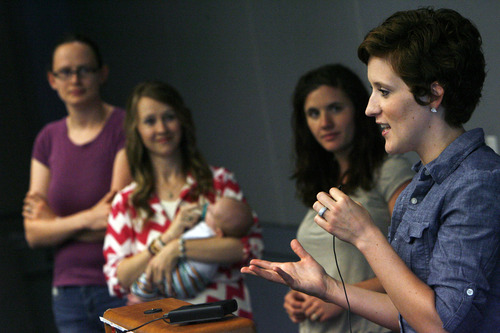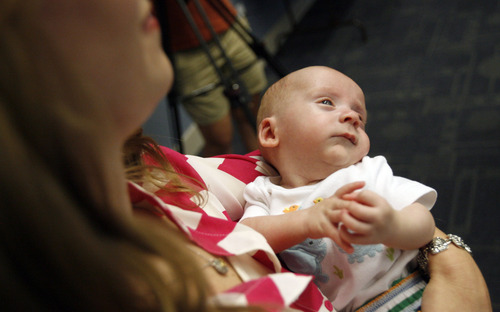This is an archived article that was published on sltrib.com in 2013, and information in the article may be outdated. It is provided only for personal research purposes and may not be reprinted.
Provo • Amanda Cooley's son was born 14 weeks early, weighing a scant two pounds. At seven weeks old, his ankle fit inside his father's wedding ring.
"I couldn't hold him, I couldn't cuddle him, I couldn't bathe him, because he was so little and so sick," the Provo mother said Thursday. "The only thing I could do was give him my milk."
Comforted by providing that nourishment, Cooley thought, "Hey, if I can do this for my baby and I have so much extra milk, I can help another mom."
She donated about 22 gallons of breast milk as Grant, now five months old and about nine pounds, grew stronger and recovered from hernia surgery. "He's been growing and eating nonstop."
On Thursday, the Utah County Health Department celebrated the opening of its new milk bank, affiliated with the Denver-based Mothers' Milk Bank, which will welcome donations from moms in Utah County and around Utah.
Located at the health department offices at 151 S. University Ave, Suite 2500 in Provo, the Utah County Mother's Milk Depot is the third bank accepting donations from Utah women.
Neonatologists call donated breast milk "liquid gold" because it helps premature babies grow and survive better than any medicine, according to the health department. Statistically, preemies who receive donated milk have shorter hospital stays and have fewer incidences of gastrointestinal disease, said Marla Raff, director of the health department's Maternal and Child Health Bureau.
Deanne Francis, a neonatal nurse and lactation consultant at Utah Valley Regional Medical Center, on Thursday stressed the dire national need for donations.
"If we can get moms in Utah who have an overabundance of riches" to donate, she said "you can not imagine what that would do" to help sick and premature infants.
Mothers' Milk Bank in Denver gathers donations of frozen milk from 12 locations and pasteurizes it before sending it to hospitals nationwide. In April, a group of women in the Provo area approached the Rocky Mountain Children's Health Foundation, which oversees the program, to suggest starting the new depot, said foundation manager Laraine Borman.
"They have tons of breast-feeding moms and they have a lot of moms with preemie babies spending a lot of time at hospitals," Borman said. "The idea of giving and giving back really hit home with them."
Provo's milk bank will be the 13th for the foundation, which is sometimes challenged to meet a growing demand for milk, Borman said. In 2012, 380,000 ounces of milk were supplied by the foundation, including 18,726 ounces requested by and sent to Utah, she said.
The Utah Valley Regional Medical Center has been using donor human milk for babies from the Mothers' Milk Bank program since 2004.
Cooley was able to donate at her hospital, Timpanogos Regional Hospital in Orem. But the advantage of the new depot will be its ability to accept donations from all mothers who meet the requirements, said Lance Madigan, a spokesman for the health department.
Donating milk to the new Provo program is simple, Francis said. Interested new mothers must fill out an online application, available at the depot's website, take a blood test and submit a milk sample, along with a list of any medical conditions, medications or supplements being taken.
The Denver milk bank will screen and evaluate the applications. Milk is accepted during the first six months after a mother's baby is born.
The Salt Lake City Mothers' Milk Donation Center, which opened in 2011, sent 54,950 ounces – or 429 gallons – to the Denver milk bank in 2012, said its co-director, Christy Porucznik. The milk was donated by about 100 women to the center, located at the Redwood Health Center in South Salt Lake.
"That's more than a gallon a day," said Porucznik, an assistant professor of public health at the University of Utah. "But the distance to our donation center has been an issue. I don't know how many have been turned away from donating because of the distance, but the easier it is to get there, the more likely it is to even consider donating."
Prolacta Bioscience has reached out to Utah moms for donations to its Helping Hands Milk Bank, which collects the milk it filters and uses to create a human milk fortifer it sells to hospitals. It recently announced plans to network with hospitals across the country to increase donations.
How to donate
I To donate to the Utah County Mother's Milk Depot, call the Rocky Mountain Children's Health Foundation at 1-877-458-5503 or visit bit.ly/1368x2e. —
Earlier Tribune stories on Utah's milk depots:





